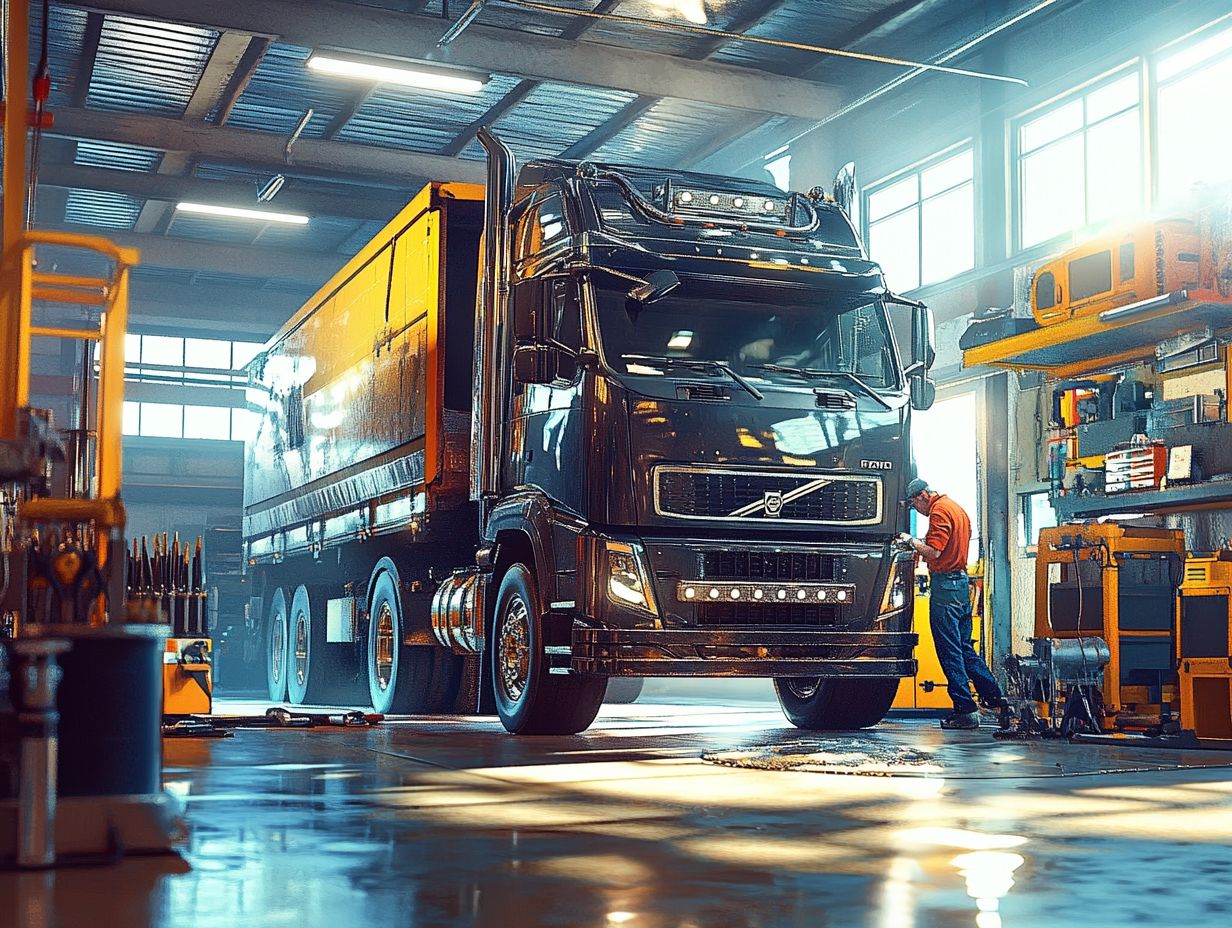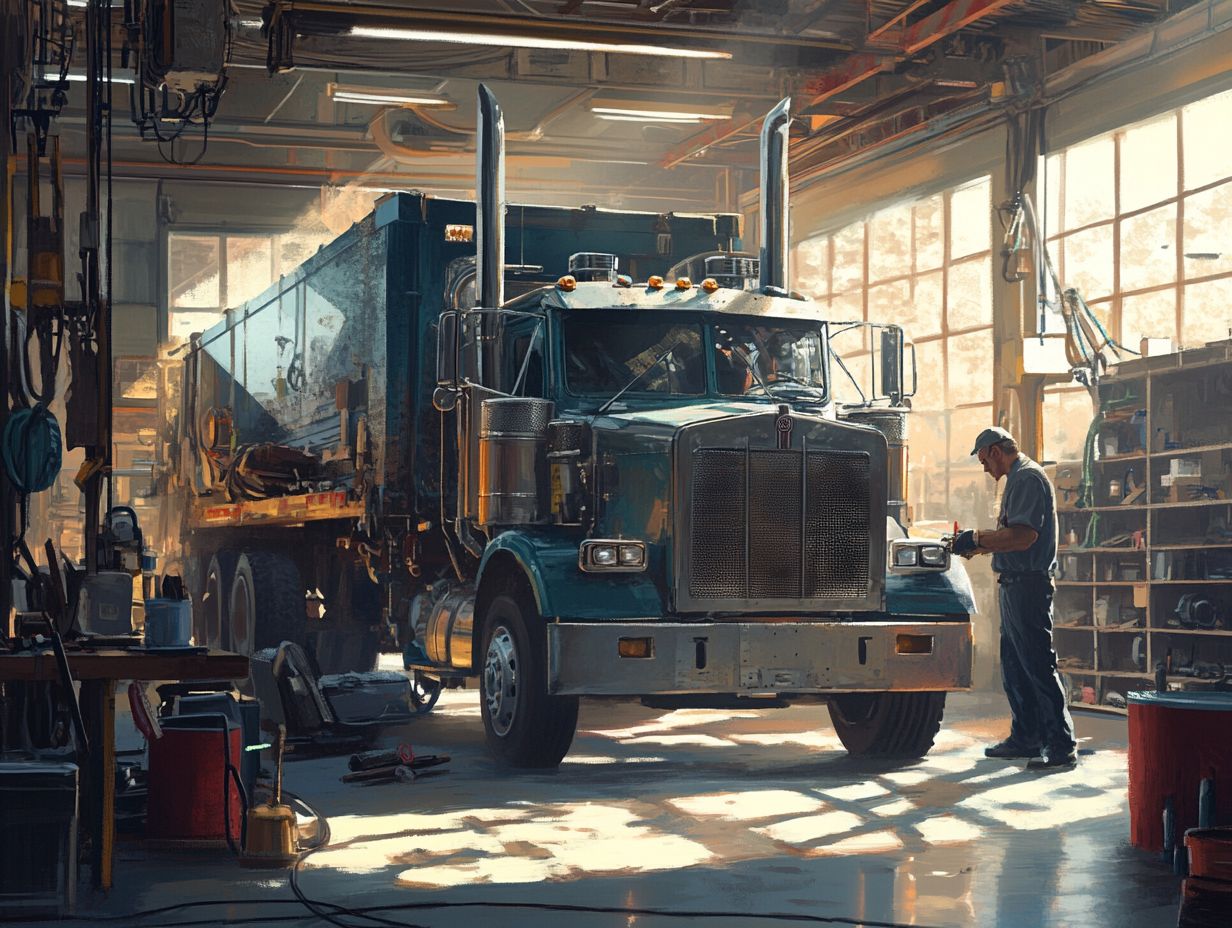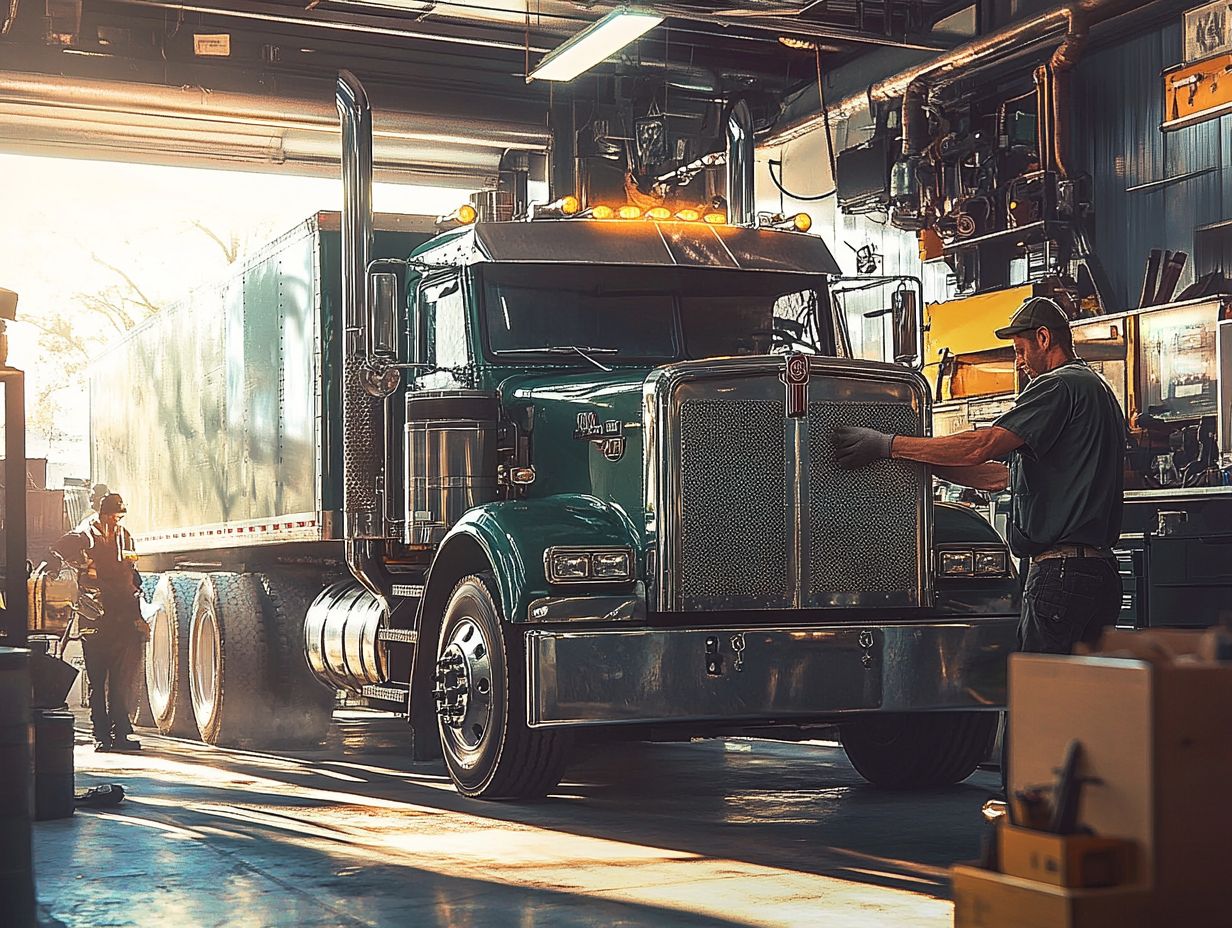What is Coverage for Heavy-Duty Vehicles?
Navigating heavy-duty vehicle coverage might feel overwhelming. But it’s crucial for protecting your investment and staying compliant with the law!
This guide distills the key aspects of coverage specifically tailored for heavy-duty vehicles. It covers liability, physical damage, and uninsured motorist protection.
You ll discover the various factors that influence your coverage options. You’ll learn the steps to secure the right insurance and uncover the critical benefits that come with adequate protection.
Grasping these components can save you money and provide invaluable peace of mind while you re on the road.
Contents
- Key Takeaways:
- Overview of Heavy-Duty Vehicle Coverage
- Types of Heavy-Duty Vehicle Coverage
- Factors Affecting Coverage for Heavy-Duty Vehicles
- How to Obtain Coverage for Heavy-Duty Vehicles
- Understanding the Importance of Coverage for Heavy-Duty Vehicles
- Frequently Asked Questions
- What is Coverage for Heavy-Duty Vehicles?
- What types of vehicles are considered Heavy-Duty?
- Is Coverage for Heavy-Duty Vehicles required by law?
- What does liability insurance cover for Heavy-Duty Vehicles?
- What is collision coverage for Heavy-Duty Vehicles?
- What does comprehensive coverage include for Heavy-Duty Vehicles?
Key Takeaways:

- Coverage for heavy-duty vehicles includes liability, physical damage, and uninsured/underinsured motorist coverage.
- Factors such as vehicle type, driving record, and insurance policy limits affect the coverage for heavy-duty vehicles.
- To obtain coverage, vehicle owners must provide necessary documents and meet specific requirements set by their insurance provider.
Overview of Heavy-Duty Vehicle Coverage
Heavy-duty vehicle coverage is vital for businesses that operate commercial vehicles. It offers essential protection against many risks that come with business use, including understanding what is coverage for special interest vehicles.
This coverage includes tailored policies designed for trucking companies. It ensures compliance with federal mandates and state regulations aimed at safeguarding your vehicles and the public from unexpected accidents.
Selecting the right insurance policy can significantly reduce financial losses linked to damages, liabilities, and other unforeseen events. This makes it a critical aspect of running a successful commercial trucking operation.
Defining Coverage for Heavy-Duty Vehicles
Coverage for heavy-duty vehicles typically encompasses a range of insurance policies tailored to shield you from liabilities, physical damage, and the risks associated with cargo transport, including coverage for utility vehicles.
These vehicles are vital for moving goods and delivering essential services. A thorough approach to insurance is necessary.
Liability coverage is your first line of defense. It protects you against claims from accidents involving bodily injury or property damage to third parties.
Physical damage coverage is equally important. It safeguards your vehicle from loss or damage, offering both collision and comprehensive options to address threats like theft or vandalism.
Cargo insurance is critical for ensuring that the loads you transport remain secure from loss or damage throughout their journey. It caters specifically to the unique needs of commercial operators who depend on these vehicles for their business success.
Types of Heavy-Duty Vehicle Coverage
You have access to a variety of heavy-duty vehicle coverage options, each meticulously designed to address the specific risks inherent in commercial operations, including coverage for vehicle modifications.
This includes liability coverage to protect against claims, physical damage coverage to safeguard your assets, and uninsured/underinsured motorist coverage to shield you from potential losses caused by other drivers.
Liability Coverage
Liability coverage is an essential element of your truck insurance policy. It offers robust protection against claims that may arise from accidents involving your commercial vehicles.
This coverage safeguards your financial interests and meets the legal requirements set forth by state regulations.
In the unfortunate event of a collision, liability coverage ensures that expenses related to bodily injury and property damage to third parties are taken care of. This helps avert potentially catastrophic financial repercussions.
By obtaining sufficient auto liability insurance, you can operate your fleet with confidence. You will know you are protected from significant liabilities that may arise during daily operations.
Ultimately, this protection secures your vehicles and bolsters your reputation and credibility within your industry.
Physical Damage Coverage

Physical damage coverage offers you crucial financial protection for your heavy-duty vehicles against the unfortunate realities of accidents, theft, and vandalism.
This type of insurance is critical for owners like you who want to safeguard against unexpected repair costs or losses. It comprises two primary components:
- Collision coverage: This takes care of damages resulting from a collision with another vehicle or object.
- Comprehensive coverage: This covers you in instances of non-collision events such as theft or natural disasters.
The deductibles you choose for these coverages significantly impact your financial responsibility when filing a claim. A deductible is the amount you pay out-of-pocket before your insurance kicks in. Opting for a higher deductible can reduce your premium costs, but remember you ll take on more financial responsibility if a covered loss occurs.
Uninsured/Underinsured Motorist Coverage
Uninsured and underinsured motorist coverage is essential for heavy-duty vehicle operators like you. It offers crucial protection against the financial fallout of accidents involving drivers who lack sufficient insurance.
This type of coverage acts as a vital safety net, ensuring you are not left exposed in situations where other drivers’ insurance may fall short. It beautifully complements your trucking insurance, enhancing the financial security you rely on while navigating the unpredictable terrain of commercial transport.
Know your liability limits! Choosing the right coverage can save you money and protect you after an accident. Setting the right coverage levels can significantly impact how you manage potential legal claims and medical expenses. Ultimately, this coverage is critical for maintaining your operational stability and peace of mind.
Factors Affecting Coverage for Heavy-Duty Vehicles
Several factors can greatly impact the coverage and premiums you encounter for heavy-duty vehicles. Considerations such as the type of vehicle, your driving record, and the selection of your insurance provider significantly shape these costs, especially when it comes to coverage for rental trucks.
Vehicle Type and Usage
The type of vehicle you choose and its specific business use are pivotal in determining the insurance coverage necessary for heavy-duty vehicles.
Consider this: light-duty trucks, often employed for smaller delivery tasks or service jobs, generally have different insurance requirements than their heavy-duty counterparts, which transport larger loads over longer distances. While light-duty vehicles might only need basic liability coverage, heavy-duty trucks that haul significant freight or operate in commercial environments often require specialized policies that include cargo insurance and higher liability limits.
This classification directly impacts premiums, as insurers assess the risks associated with different vehicle types. This assessment ultimately shapes the cost of the coverage specifically tailored for these vehicles.
Driving Record and History
A driver s record and history play a crucial role in determining the cost and availability of insurance coverage for heavy-duty vehicles. Insurers examine various factors, such as accidents, violations, and claims history, to evaluate risk profiles.
Maintaining a clean driving record signals safety and reliability, often resulting in lower premiums and more extensive coverage options.
A history of accidents can drive up your premiums and limit your choices. This is why it’s vital for businesses to adopt effective risk control measures, including:
- Train your drivers for safety!
- Regular vehicle maintenance
These practices significantly enhance safety. When a claim arises, having a well-documented and transparent process is essential not only to expedite settlements but also to foster a positive relationship with your insurance provider.
Insurance Provider and Policy Limits

Choosing the right insurance provider and understanding policy limits are crucial steps to securing effective coverage for your heavy-duty vehicles.
As you navigate the world of trucking insurance, evaluate the factors that influence your decision. The range of coverage options offered by potential providers is essential; it safeguards you against risks, from accidents to the loss of goods being transported.
The reputation of an insurer, reflected in customer reviews and industry ratings, provides insights into their reliability and the quality of their customer service. It’s important to understand how policy limits affect premium costs. While higher limits may lead to increased payments, they offer enhanced protection that could save you money in the event of a claim.
How to Obtain Coverage for Heavy-Duty Vehicles
Securing coverage for heavy-duty vehicles requires a thorough understanding of essential steps, such as comparing insurance options and gathering the necessary documentation. Being well-prepared helps you make the best choices for your unique needs!
Steps to Take for Coverage
The first step in securing robust coverage for your heavy-duty vehicle is to assess your needs. Start your insurance shopping by comparing various coverage options.
This process requires evaluating factors like the type of heavy-duty vehicle you own, its primary purpose, and any relevant regulations. Once you understand your requirements, research different providers and their offerings. Pay attention to coverage limits, deductibles (the amount you pay out of pocket before insurance kicks in), and additional features like roadside assistance or cargo coverage.
Consulting with an insurance agent can provide invaluable insights. They can guide you through the intricacies of various plans, ensuring you choose the right coverage that supports your business operations.
Documents and Requirements
To successfully secure heavy-duty vehicle coverage, prepare essential documents and meet specific requirements related to commercial truck insurance.
This involves providing proof of your business operations, including a valid business license and tax identification number. Depending on the insurer you choose, you may need to submit a complete list of all the vehicles you intend to insure. This list should detail the make, model, year, and VIN of each vehicle.
If your business operates a fleet, detailing the number of vehicles and their intended use can significantly enhance your application. A well-organized set of documents streamlines the process and may lead to favorable coverage options tailored to your company’s needs.
Understanding the Importance of Coverage for Heavy-Duty Vehicles
Recognizing the significance of comprehensive coverage for heavy-duty vehicles is vital. Understanding coverage for personal vehicles offers critical protection against transportation risks that could adversely affect business operations.
Start comparing insurance options today!
Benefits and Protection for Vehicle Owners

The benefits of having comprehensive coverage for heavy-duty vehicles go well beyond mere compliance; they offer crucial protection for you and your business, especially when considering coverage for off-roading.
By investing in this type of coverage, you gain essential liability protection that shields you from costly lawsuits arising from road accidents or incidents.
This vehicle insurance ensures financial security during unexpected repairs or damages and provides you with peace of mind. It allows you to concentrate on your core operations without the nagging worry of unforeseen expenses.
A solid coverage plan includes various protections that keep you safe, such as cargo insurance, which helps mitigate risks associated with transporting goods. This type of business insurance helps you manage your fleet responsibly and effectively.
Frequently Asked Questions
What is Coverage for Heavy-Duty Vehicles?
Coverage for Heavy-Duty Vehicles protects large vehicles like trucks and buses. It helps with costs from accidents or damages, typically including liability insurance, collision coverage, and coverage for specialized vehicles.
What types of vehicles are considered Heavy-Duty?
Heavy-Duty vehicles are commonly defined as those that weigh over 26,000 pounds, have three or more axles, and are used for commercial purposes. This category includes semi-trucks, dump trucks, and tractor-trailers.
Is Coverage for Heavy-Duty Vehicles required by law?
Yes, most states require commercial vehicles to have a certain level of insurance coverage. The specific requirements may vary, so it’s important to check with your state’s Department of Motor Vehicles for the exact regulations.
What does liability insurance cover for Heavy-Duty Vehicles?
Liability insurance for Heavy-Duty Vehicles covers damages or injuries caused to other people or their property in the event of an accident. This can include medical expenses, property damage, and legal fees.
What is collision coverage for Heavy-Duty Vehicles?
Collision coverage is an optional type of insurance that covers damages to your own vehicle in the event of a collision or accident. This can help pay for repair or replacement costs.
What does comprehensive coverage include for Heavy-Duty Vehicles?
Comprehensive coverage is another optional insurance that covers damages to your vehicle caused by non-collision events, such as theft, vandalism, or natural disasters. It can also cover expenses for towing and storage.





